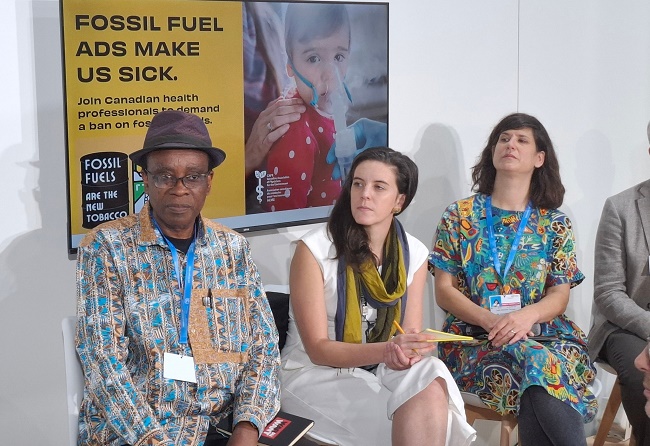At the 29th session of the Conference of the Parties (COP29) to the UN Framework Convention on Climate Change (UNFCCC) where world leaders gather under the banner of climate action, criticism has reached a fever pitch from climate activists and vulnerable nations, who accuse high-emission countries of using carbon trading as a diversion from real environmental accountability.

Representatives from the Global South, environmental activists, and indigenous leaders are warning that the conference risks transforming into a “carbon trade fair” that prioritises profit over people.
Nnimmo Bassey, a Nigerian environmentalist and director of HOMEF, was emphatic: “This conference has turned into a business model for rich nations and corporations to pay their way out of climate accountability. Every carbon credit bought by a wealthy nation is another license for them to keep polluting while the frontline communities drown in emissions they never caused.”
Bassey’s perspective resonates with other attendees frustrated by what they see as shallow promises devoid of substantive action.
Carbon trading has long been touted as a market-based solution to reduce emissions. However, critics argue it allows major polluters to buy offsets rather than actually reduce their own emissions. Through this model, developed nations can fulfill climate commitments on paper while expanding fossil fuel projects. Environmentalists are skeptical, viewing it as a loophole that permits more pollution without addressing the root causes of climate change.
Fiji-based activist Joapi, representing the Pacific Climate Warriors, stated bluntly, “Every ton of carbon emitted by the Global North is another attack on our communities. Carbon trading is not justice; it’s colonialism by another name.”
Joapi’s Pacific Island home is among the most vulnerable, already seeing villages displaced by rising sea levels and freshwater contaminated by encroaching saltwater.
The exploitation of carbon credits has transformed many developing nations into unwitting overseers of “carbon sinks” in forests and wetlands, where they must commit their natural resources to offset emissions from wealthier nations. This carbon colonialism, critics argue, prioritises corporate profits and the lifestyles of industrialised nations at the expense of frontline communities’ survival.
Yvonne Yáñez of Acción Ecológica voiced her concerns: “This isn’t financing climate action for the Global South. This is a rebranding of debt and dependency. Conditional loans from institutions like the World Bank shackle us to perpetual repayment, and what they call ‘aid’ comes with conditions that strip away our sovereignty.”
Instead, Yáñez and other activists argue for a fundamental shift in climate financing, calling it an issue of historical responsibility and justice. Their demands include reparations from high-emission countries to the Global South, covering not only the economic costs of adaptation and resilience but also the profound ecological and cultural losses already suffered by these regions.
Estimates from environmental economists place the ecological debt owed by wealthy nations at around $5 trillion, a figure that underscores the scale of the damage inflicted by colonial extraction and industrial pollution. Yet, climate finance commitments have consistently fallen short. Despite the promise of $100 billion annually starting in 2020, this target remains unmet, with funds often offered in the form of loans rather than direct support.
“We’re talking about communities that need lifelines, not loans. These loans turn climate finance into a business scheme to extract even more wealth from the Global South,” said Yáñez.
Dr Rosalid Nkirote, the Executive Advisor, African Coalition of Communities Responsive to Climate Change, noted that COP29 is once again becoming a meeting of corporate and national interests rather than a genuine response to the climate crisis. As the Global North spends an estimated $2.4 trillion annually on defense, the $100 billion promised for climate finance remains elusive.
She argues that this is not a matter of resources but of political will: “If they can find trillions for war, they can find funds for the climate. The refusal to act decisively isn’t just a policy choice; it’s a direct attack on vulnerable communities.”
The call from climate activists at COP29 is clear: rather than engaging in superficial solutions, nations must confront the roots of climate change, starting with an urgent, enforceable transition away from fossil fuels. They argue that climate action must be led by justice, responsibility, and reparations, not by financial engineering and “offsets” that allow the pollution to continue.
Global South representatives and activists are urging the formation of a Fossil Fuel Non-Proliferation Treaty to bring an end to unchecked fossil fuel expansion. This would set legally binding measures to end new fossil fuel projects and hold polluters accountable. For these communities, real climate finance is reparative, not an investment opportunity for banks and corporations.
Henry Opondo, Advocacy Advisor at ACCRCC, noted that, as COP29 draws on, those on the front lines of the climate crisis are calling for systemic change, not just words.
“Any viable solution must involve direct funding for climate adaptation, and reparations to countries that have suffered the brunt of a crisis they did not create,” he noted.
